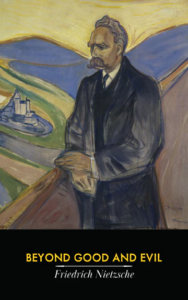SUMMARY
- Challenging traditional moral values and philosophical assumptions, urging a reevaluation of established moral dichotomies.
- Introduces the “will to power” concept as a fundamental driving force behind human behaviour.
- Critiques past philosophers’ dogmatic acceptance of simplistic constructs like “good” versus “evil.”
- Encourages a more nuanced understanding of morality based on individual perspectives and experiences.
- Influences existential and postmodern thought, prompting ongoing debates about ethics, truth, and human motivation.
REVIEW
Beyond Good and Evil, published in 1886 by Friedrich Nietzsche, is a seminal work that challenges the foundations of traditional moral values and philosophical assumptions. Nietzsche’s critique of established moral dichotomies, such as “good” versus “evil,” invites readers to reconsider the complexities of human nature and the motivations behind moral judgments.
In “Beyond Good and Evil,” Nietzsche critiques the dogmatic acceptance of established moral dichotomies by past philosophers. He argues that these simplistic constructs fail to capture the true nature of human instincts and desires. By questioning the objectivity of moral truths, Nietzsche encourages a more nuanced understanding of morality that transcends conventional binaries. This approach has profoundly impacted readers, as it invites them to explore morality from a more personal and subjective perspective.
The book’s influence extends beyond philosophy, impacting existential and postmodern thought. Nietzsche’s ideas have sparked ongoing debates about ethics, truth, and human motivation, challenging individuals to reevaluate their values and beliefs. By advocating for reevaluating values based on individual perspectives and experiences, Beyond Good and Evil resonates with those seeking a deeper understanding of human nature.
One of the central concepts in Beyond Good and Evil is the “will to power,” which Nietzsche presents as a fundamental driving force behind human behaviour. He suggests that moral judgments are not objective truths but expressions of underlying instincts and desires. This idea challenges the notion of absolute morality and encourages readers to consider the subjective nature of ethical beliefs. Nietzsche also critiques the limitations of traditional philosophy, urging readers to move beyond established moral frameworks. He advocates for a more dynamic and individualised approach to understanding morality that embraces the complexities of human experience. By questioning the validity of conventional moral dichotomies, Nietzsche opens the door to a more flexible and personal exploration of ethical values.
What makes Beyond Good and Evil special is its provocative examination of morality beyond conventional binaries. Nietzsche’s challenge to traditional moral values and philosophical assumptions invites readers to transcend established notions of right and wrong. By encouraging reevaluating values based on individual perspectives, the book inspires and influences those seeking a deeper understanding of human motivation and ethics.

CHARACTERS
Nietzsche himself: The philosopher and author critiques traditional moral values and introduces the concept of the “will to power.”
The nobleman: Represents the ideal individual who embraces life and power, which contrasts with the herd mentality.
The priest: Symbolises the moral authority that Nietzsche critiques, embodying the dogmatic acceptance of established moral values.
The herd: Represents the masses who conform to societal norms and reject individualism, often criticised by Nietzsche.
The philosopher: A general term for various thinkers Nietzsche critiques, highlighting their adherence to simplistic moral dichotomies.
The free spirit: An individual who seeks to transcend conventional morality and embrace personal values and instincts.
The woman: Often discussed concerning themes of power and sexuality, representing both a muse and a challenge to male philosophers.
LOCATIONS
No locations of importance are mentioned.
IMPROVES
- Creativity and Imagination: Nietzsche’s exploration of ideas can inspire innovative thinking and artistic expression.
- Analytical Thinking: Engaging with his complex philosophies enhances critical reasoning and problem-solving skills.
- Self-awareness: Nietzsche encourages introspection, helping readers understand their values and beliefs.
- Emotional Intelligence: His insights into human nature foster a deeper understanding of emotions and relationships.
- Cultural Awareness: Nietzsche’s critique of society promotes a broader perspective on cultural norms and values.
REFERENCES
- Review of Nietzsche’s Beyond Good and Evil – UZPG
- The Soul of Nietzsche’s Beyond Good and Evil | Notre Dame Philosophical Reviews
- Beyond Good and Evil by Friedrich Nietzsche Plot Summary | LitCharts
- Beyond Good and Evil by Friedrich Nietzsche | Study.com
- Nietzsche’s Beyond Good and Evil – Edinburgh University Press

